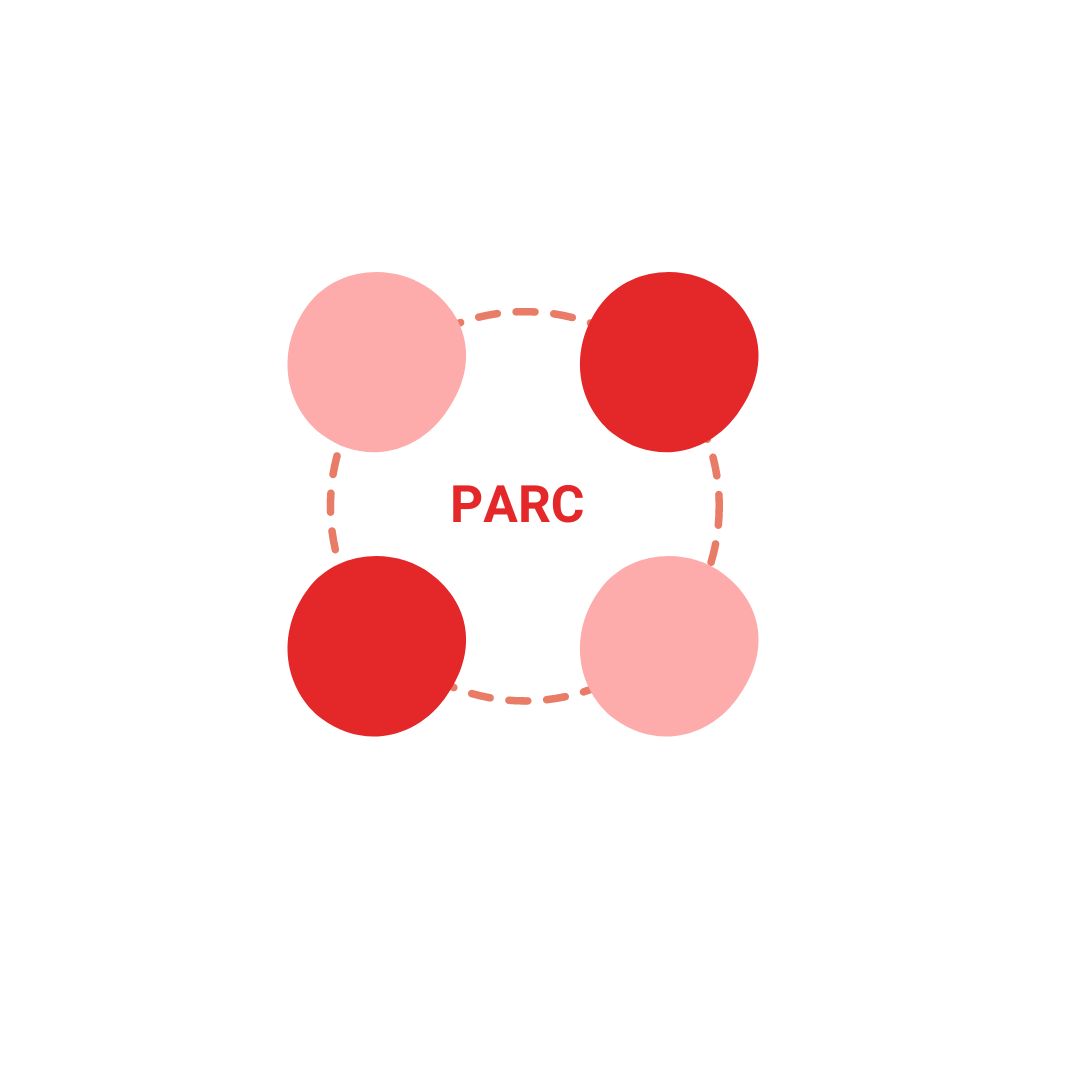In today’s digital age, having a robust online presence is crucial for any business, including dental practices. Digital marketing offers an array of opportunities to connect with current and potential patients, establish your brand, and stand out in a competitive market. This guide delves into effective digital marketing strategies tailored for dental practices, aiming to help you attract more patients, build trust, and enhance your online visibility.
First, let’s examine the benefits of digital marketing for dentists.
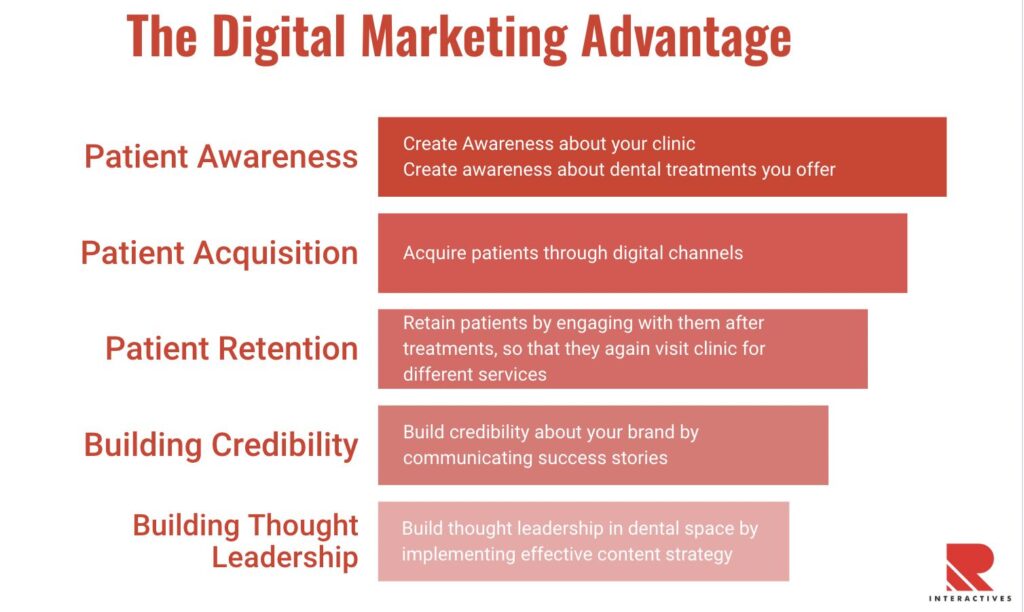
1. Understanding Your Audience
Successful digital marketing strategies for dental practices begin with a deep understanding of your target audience. This foundational step involves identifying who your patients are (or who you want them to be) and gaining insights into their needs, preferences, and behaviors, especially in the online realm. Here’s a breakdown of how to approach this:
1) Identifying the Target Audience for Dental Practices
The target audience for a dental practice can vary widely depending on the services offered, the practice’s location, and its specialization. It may include:
- Families seeking general dental care for all ages.
- Young adults looking for cosmetic dentistry services such as teeth whitening or orthodontics.
- Seniors requiring more specialized dental treatments.
- Individuals searching for emergency dental services.
Identifying your target audience involves analyzing your current patient base, understanding the demographics of the area your practice serves, and determining the types of services you want to focus on. This process helps tailor your marketing efforts to attract the patients who are most likely to need your services.
2. Understanding Search
a) Paid Search
Paid search ads, also known as pay-per-click (PPC) ads, are a form of digital advertising where advertisers pay a fee each time their ad is clicked. These ads appear at the top or bottom of search engine results pages (SERPs) like Google or Bing when users search for specific keywords related to the advertiser’s products or services. For dentists, paid search ads offer a strategic way to increase visibility among potential patients actively searching for dental services online.
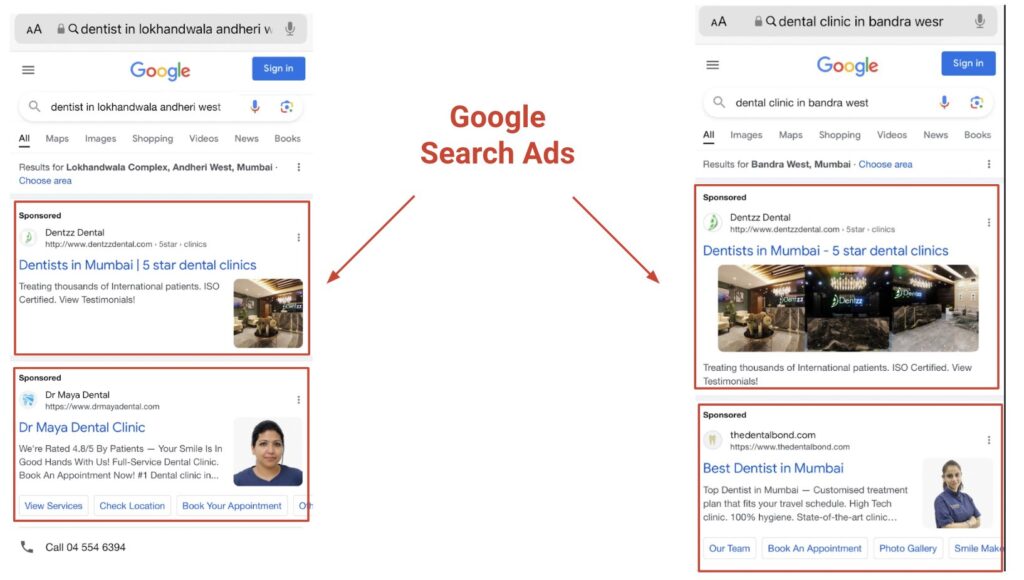
How Paid Search Ads Work for Dentists
Keyword Selection:
Dentists start by selecting relevant keywords that potential patients might use when searching for dental services online. These keywords could range from general terms like “dentist near me” or “dental clinic” to more specific services like “teeth whitening” or “pediatric dentist.”
Ad Creation:
Once keywords are selected, dentists create ads that will show up in the search results for those terms. These ads typically include a headline, a description, and a link to the dentist’s website or a specific landing page. The ad might highlight unique selling points, services offered, or special promotions.
Bidding:
Paid search ads operate on a bidding system where advertisers set how much they’re willing to pay each time someone clicks on their ad. This bid, along with factors like ad relevance and quality, determines the ad’s placement in the search results.
Targeting:
Dentists can target their ads based on various factors, including geographic location, to ensure they’re reaching potential patients in their local area. This is crucial for local businesses like dental clinics, as it helps attract patients who can realistically visit the practice.
Budget Control:
Dentists have complete control over their advertising budget, allowing them to set daily spending limits and adjust their bids based on the performance of their ads.
Benefits of Paid Search Ads for Dentists
Immediate Visibility:
Unlike SEO, which can take months to improve search rankings organically, paid search ads offer immediate placement at the top of SERPs, providing quick visibility to potential patients.
Targeted Advertising:
Paid search ads allow dentists to target their ads to a specific audience based on keywords, location, and even the time of day, ensuring that their marketing efforts are focused on individuals most likely to need their services.
Measurable Results:
With paid search advertising, dentists can track the performance of their ads in real-time, including how many clicks they’re getting, the cost per click, and conversion rates. This data helps in making informed decisions and optimizing campaigns for better results.
Cost-Effectiveness:
Dentists only pay when someone clicks on their ad, making paid search advertising a cost-effective option. Additionally, by targeting ads effectively and optimizing campaigns, dentists can maximize their return on investment (ROI).
Using Paid Search Ads Effectively
For dentists to make the most out of paid search ads, it’s important to:
- Continuously refine and optimize keyword selections based on performance and search trends.
- Craft compelling ad copy that clearly states what sets their practice apart from competitors.
- Use landing pages that are relevant to the ad and make it easy for potential patients to take action, such as making an appointment.
- Monitor and adjust bids and budgets based on the performance of the ads to ensure cost-effectiveness.
b) Google My Business
Google My Business (GMB) is a free tool provided by Google that allows businesses to manage their online presence across Google, including Search and Maps. By creating a Google My Business profile, businesses can provide valuable information to potential customers, such as their business hours, location, contact information, and services offered. For a dental clinic, leveraging Google My Business can significantly enhance its visibility online and attract more patients. Here’s how:
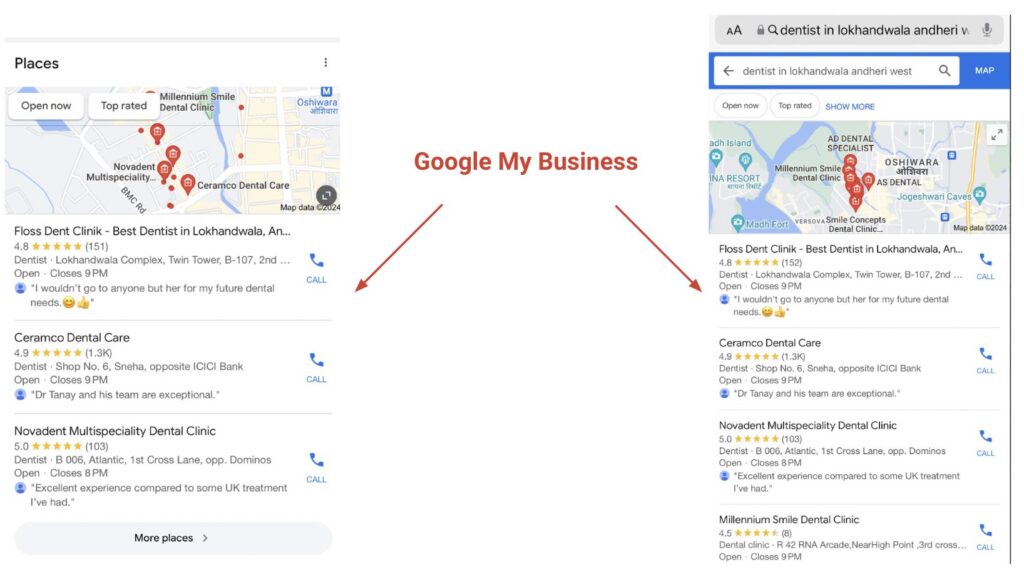
Increased Visibility in Local Searches
When potential patients search for dental clinics in their area, a well-optimized Google My Business profile can help your clinic appear prominently in the search results. This is particularly important for local searches, where people are looking for services near them. Your GMB listing can appear in Google’s local “3-pack,” which is the block of three business listings that appear at the top of Google search results for local queries.
Access to Important Information
Through your GMB profile, you can provide essential information to potential patients without them needing to visit your website. This includes your clinic’s hours of operation, location, contact details, and even the specific dental services you offer. Having this information readily available can be the deciding factor for someone choosing your clinic over another.
Enhancing Trust Through Reviews
Google My Business allows customers to leave reviews of your dental clinic directly on your profile. Positive reviews can significantly enhance your clinic’s credibility and attract more patients. Moreover, responding to reviews, whether positive or negative, demonstrates that you value patient feedback and are committed to providing excellent service.
Showcase Your Clinic
You can upload photos and videos to your Google My Business profile, offering potential patients a glimpse into your clinic. Showing off your clean, welcoming environment, state-of-the-art equipment, or smiling staff can make your clinic more appealing to prospective patients.
Insight into Your Clinic’s Performance
Google My Business provides insights and analytics that show how people find your business listing on the web and how they interact with it. You can see the number of views your listing gets, how many people call your clinic directly from the listing, and more. This data can help you understand your patients better and optimize your online presence accordingly.
Easy to Update
Your Google My Business profile is easy to update. If your clinic’s hours change, you move to a new location, or you want to add a new service or special offer, you can quickly update your profile to reflect these changes. This ensures that potential patients always have the most current information about your clinic.
c) Search Engine Optimization (SEO)
SEO, or Search Engine Optimization, is the practice of increasing the quantity and quality of traffic to your website through organic search engine results. It involves optimizing your website’s content and structure to make it more attractive to search engines like Google. For dental clinics, implementing effective SEO strategies can significantly enhance online visibility, attract more potential patients, and ultimately grow the practice.
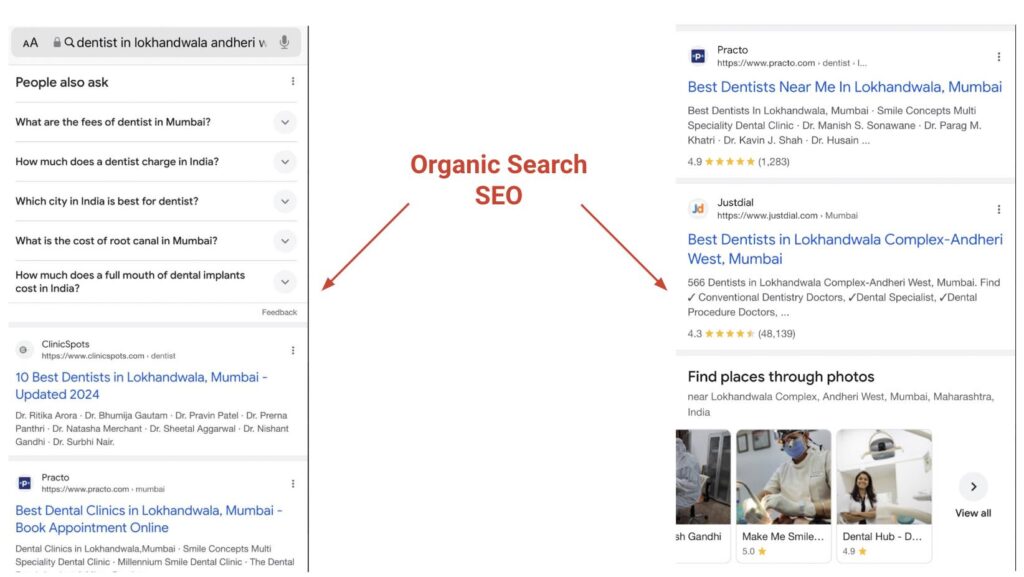
Here’s how SEO can help dental clinics:
Improved Visibility in Search Results
SEO helps dental clinics rank higher in search engine results for relevant keywords and phrases related to dental services. When someone searches for terms like “best dentist near me” or “teeth whitening services,” a well-optimized dental clinic website has a better chance of appearing at the top of the search results. Higher visibility increases the likelihood that potential patients will visit your website.
Increased Website Traffic
By ranking higher in search results, dental clinics can see an increase in organic traffic to their website. SEO attracts users who are actively searching for dental services, which means the traffic is not just higher in quantity but also more targeted and likely to convert into appointments.
Enhanced User Experience
SEO isn’t just about pleasing search engines; it’s also about providing a better experience for your website visitors. This includes creating a mobile-friendly website, improving page load times, and organizing site content in a way that’s easy to navigate. A positive user experience can help keep potential patients on your site longer, increasing the chances they’ll make an appointment.
Establishing Trust and Credibility
Websites that appear higher in search results are often perceived as more trustworthy and credible by users. By implementing SEO best practices and achieving a top ranking, a dental clinic can enhance its reputation online. This trust is crucial in the healthcare industry, where patients are looking for reliable and professional care providers.
Cost-Effectiveness
Compared to paid advertising, SEO is a cost-effective strategy to attract new patients. While it may require upfront investment in terms of time and resources, once your website ranks well for relevant keywords, it continues to attract traffic without the need for ongoing advertising spend. This makes SEO a sustainable long-term strategy for patient acquisition.
Local SEO for Local Patients
For dental clinics, local SEO is particularly important. This includes optimizing your website for local search terms, creating a Google My Business profile, and ensuring your clinic’s name, address, and phone number (NAP) are consistent across the web. Local SEO helps dental clinics attract patients from their geographic area, which is vital for businesses that rely on local clientele.
Competitive Advantage
By investing in SEO, dental clinics can gain a competitive edge over other local clinics that may not be optimizing their online presence. A strong SEO strategy can help you stand out in a crowded market, attracting more patients to your clinic instead of competitors.
SEO is a powerful tool for dental clinics to improve their online visibility, attract more targeted website traffic, enhance the user experience, and establish trust and credibility with potential patients. Through strategic optimization efforts, dental clinics can achieve higher search rankings, attract more patients, and grow their practice effectively.
3. Website Optimization
In the digital era, a dental clinic’s website serves as its online storefront. It’s often the first point of contact potential patients have with the clinic, making its design, usability, and optimization crucial for attracting and retaining patients. Here’s how dental clinics can optimize their websites:
The Role of a Well-Designed, User-Friendly Website
First Impressions: A well-designed website creates a positive first impression, reflecting the professionalism and quality of care patients can expect from the clinic.
Ease of Navigation: A user-friendly website allows visitors to easily find the information they’re looking for, such as services offered, location, and how to make an appointment, improving the overall user experience and encouraging engagement.
Tips for Optimizing the Website for Search Engines (SEO)
Relevant Keywords: Incorporating keywords that potential patients are likely to use when searching for dental services (e.g., “cosmetic dentistry [City Name],” “emergency dental care,” or “teeth whitening services”) helps improve the site’s visibility in search results.
Content Optimization: Ensure that each page on the website, from service descriptions to blog posts, uses these keywords naturally and informatively, enhancing the site’s relevance and authority in search engines.
Mobile Optimization
Responsive Design: With the increasing use of smartphones, a mobile-optimized website is essential. A responsive design ensures the website looks and functions well on devices of all sizes, improving accessibility and user experience.
Google’s Mobile-First Indexing: Google predominantly uses the mobile version of the content for indexing and ranking, making mobile optimization critical for SEO.
Loading Speed Improvements
User Experience: Websites that load quickly provide a better user experience, reducing bounce rates and encouraging visitors to spend more time exploring the clinic’s services.
SEO Ranking Factor: Page loading speed is a ranking factor for Google. Faster websites are more likely to rank higher in search results, making speed optimization crucial.
Importance of Clear, Concise, and Engaging Content
- Patient Engagement: Clear and engaging content helps keep potential patients informed and engaged, whether it’s through detailed service descriptions, informative blog posts, or answers to frequently asked questions.
- Building Trust: Providing valuable content can help establish the clinic as a trustworthy and authoritative source of dental information, encouraging patients to choose the clinic for their dental care needs.
Implementing Website Optimization
Implementing these optimization strategies requires a combination of technical SEO skills, content creation, and website design. Dental clinics can start by auditing their current website to identify areas for improvement, such as outdated content, slow loading speeds, or lack of mobile responsiveness. From there, clinics can prioritize updates that will have the most significant impact on user experience and search engine visibility.
A well-optimized website is fundamental for dental clinics looking to attract new patients and establish a strong online presence. By focusing on design, usability, SEO, and content quality, clinics can improve their website’s performance, leading to increased visibility, patient engagement, and ultimately, practice growth.
4. Content Marketing for Dental Clinics
Content marketing is a strategic approach focused on creating and distributing valuable, relevant, and consistent content to attract and retain a clearly-defined audience — in this case, potential dental patients. For dental clinics, content marketing not only helps in attracting new patients but also in establishing the clinic’s reputation as a trusted authority in dental care. Here’s how dental clinics can leverage content marketing:
Strategies for Creating Valuable and Informative Content
- Identify Patient Needs and Interests: Start by understanding what your potential patients are looking for. What are their common concerns, questions, or misconceptions about dental care? Use this insight to guide your content creation efforts.
- Diversify Your Content: While blog posts are crucial, consider incorporating other formats such as videos, infographics, and interactive quizzes to engage different segments of your audience.
- Consistency is Key: Regularly update your blog and social media channels with fresh content to keep your audience engaged and encourage repeat visits to your website.
Blog Posts About Dental Health Tips
- Educational Content: Create blog posts that educate your audience about oral hygiene practices, the importance of regular dental check-ups, and how to prevent common dental issues.
- Procedure Explanations: Demystify dental procedures for your patients by explaining them in layman’s terms. This can help reduce anxiety and make patients more comfortable with the idea of undergoing dental treatments.
- Lifestyle Content: Offer advice on lifestyle topics related to dental health, such as diet, smoking cessation, and managing diabetes for better oral health.
FAQs About Common Dental Procedures
- Address Common Questions: Compile a list of frequently asked questions that patients have about dental procedures offered at your clinic. Answer these questions thoroughly and clearly on your website.
- Procedure Preparation and Aftercare: Include information on how patients should prepare for procedures and manage their recovery afterward. This can help set realistic expectations and improve patient satisfaction.
Using Content to Establish Expertise and Trust
- Showcase Your Expertise: Use your content to demonstrate your knowledge and expertise in dentistry. Articles that delve into the latest research, case studies, or advancements in dental technology can help establish your clinic as a leader in the field.
- Patient Testimonials and Case Studies: Share stories of how your clinic has helped patients achieve better dental health or transform their smiles. Real-life examples can be very persuasive in showcasing your clinic’s capabilities and building trust with prospective patients.
- Transparency: Be honest and transparent in your content about what patients can expect from various procedures, including potential risks and benefits. This honesty can go a long way in building trust.
Benefits of Content Marketing for Dental Clinics
Content marketing can significantly enhance a dental clinic’s digital marketing strategy by:
- Improving SEO and online visibility.
- Driving traffic to the clinic’s website.
- Establishing the clinic’s brand and reputation as a trusted authority in dental care.
By providing valuable and informative content, dental clinics can attract more engaged and informed patients, foster a sense of trust and reliability, and ultimately, grow their practice. Content marketing is not just about attracting new patients; it’s also about educating and empowering them to make informed decisions about their dental health, thereby enhancing patient satisfaction and loyalty.
5. Social Media Marketing
Social media marketing is an invaluable tool for dental clinics aiming to enhance their online presence, engage with existing and potential patients, and build a sense of community. Here’s how dental clinics can effectively leverage social media marketing:
Choosing the Right Social Media Platforms for Your Dental Practice
- Identify Your Audience: Different platforms attract different demographics. Facebook and Instagram are great for reaching a broad audience, including families and young adults. LinkedIn might be more appropriate for professional networking and reaching other businesses.
- Consider Your Content Type: Visual platforms like Instagram and Pinterest are ideal for sharing images and videos, such as before and after photos or educational content. Twitter can be used for quick updates, links to blog posts, or industry news.
Tips for Engaging Content on Social Media
- Consistency is Key: Regular posting keeps your audience engaged and helps maintain your practice’s presence in their minds. Create a content calendar to plan your posts in advance.
- Diversify Your Content: Mix different types of posts to keep your feed interesting. Include educational content, behind-the-scenes looks at your clinic, staff introductions, and fun dental facts.
- Engage With Your Audience: Respond to comments, messages, and reviews to show that you value your patients’ feedback. Ask questions and run polls to encourage interaction.
Before and After Photos of Dental Procedures
- Showcase Your Work: Before and after photos can be powerful testimonials of your work, illustrating the quality and impact of your dental services.
- Patient Consent: Always obtain explicit consent from patients before sharing their photos online to ensure privacy and compliance with healthcare regulations.
Patient Testimonials (With Consent)
- Build Trust: Sharing patient testimonials on social media can significantly enhance trust and credibility. Positive experiences from real patients can influence potential patients’ decisions to choose your clinic.
- Video Testimonials: Consider video testimonials for a more personal touch. Seeing and hearing a satisfied patient speak about their experience can be more impactful than reading text.
Educational Videos About Dental Care
- Provide Value: Educational videos can help demystify dental procedures, offer oral health tips, and answer common questions, providing value to your audience.
- Professional Yet Approachable: Ensure the videos are professional but not overly technical. The goal is to educate and reassure, not overwhelm, your audience.
Strategies for Interacting With Followers and Building a Community
- Be Active and Responsive: Regular interaction with your followers can help build a sense of community. Acknowledge comments, share user-generated content (with permission), and participate in relevant conversations.
- Create Exclusive Social Media Groups: Consider creating exclusive groups or forums for your patients on platforms like Facebook. These can be spaces for sharing oral health tips, clinic updates, and fostering a supportive community.
Implementing Social Media Marketing
Implementing an effective social media marketing strategy requires planning, creativity, and consistency. By choosing the right platforms, creating engaging and informative content, and actively interacting with your audience, dental clinics can significantly enhance their online presence, attract new patients, and build stronger relationships with their community.



